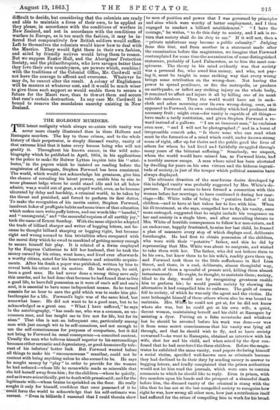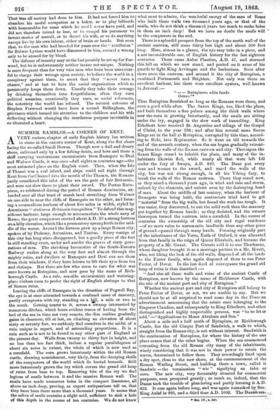THE HOLBORN MURDERS.
II1HE latent malignity which always co-exists with vanity was never more clearly illustrated than in these Holborn and Ramsgate murders. The key to those crimes, and to the whole history of their perpetrator, is simply diseased vanity, vanity of that extreme kind that it hates every human being who will not gratify it. Throughout his known career, in the wild auto- biography which he published in April, 1864, in his applications to the police to make Sir Bulwer Lytton inquire into his "attri- butes," in the papers which he insisted on reading before the magistrates of Ramsgate, Stephen Forwood has been consistent. The world, which would not acknowledge his greatness, give him the chance of revealing his latent powers, enable him to rise to some pleasant ledge where he could stand idle and let all below admire, was.a world out of gear, a stupid world, even, as he became ulcerated by delay and hardship, a criminal world, to be taken by the throat and punished, and forced to perform its first duties. To make the recognition of his merits easier, Stephen Forwood, insolvent baker of profligate habits and some trace of that education which makes men write puffy letters, and use words like "baneful," and "uncongenial," and "the mournful requiem of all earthly joy," took the name of Ernest Southey. With the same object he adopted the trade of billiard sharper and writer of begging letters, not be- cause he thought billiard sharping or begging right, but because right and wrong seemed to him trivialities when compared with the moral duty which he owed to mankind of getting money enough to secure himself fair play. It is related of a Swiss employed by the Empress Catherine to kill her husband, that be took the money earned by his crime, went home, and lived ever afterwards a worthy citizen, noted for his benevolence and scientific acquire- ments. After his death a paper was published, written by him to reveal both his crime and its motive. He had always, he said, been a good man. He had never done a wrong thing save only this murder, and he had done that because he had found that to live a good life, to have full possession as it were of one's self and one's soul, it is essential to have some independent means. So he turned amain for an hour to earn the gold which was to make him phi- lanthropist for a life. Forwood's logic was of the same kind, but somewhat baser. He did not want to be a good man, but to be acknowledged as a great one. "What I have suffered," he says in the autobiography, "has made me, who was a common, an un- common man, and has taught me to live not for life, but for its aims." That idea is not, an infrequent one, particularly among men with just enough wit to be self-conscious, and not enough to use the self-consciousness for purposes of comparison, but it did not bring to Forwood its usual consequence—a conceited content. Usually the man who believes himself superior to his surroundings becomes either sarcastic and depreciatory, or good-humouredly tole- rant of his inferiors' better luck. But Forwood wanted before all things to make his " uncommonness " manifest, could not be content with being anything unless he also seemed to be. He says he sought money by "play" in order to provide for the woman he had seduced—whose life he meanwhile made so miserable that she hid herself away from him ; for the children—whom he quietly, and as itwere scientifically, put to death with pruseicacid; and for the legitimate wife—whose brains he sprinkled on the floor. He really sought it only for himself, confident that once possessed of it he .could force the world to acknowledge that his self-estimate was correct. "Even in billiards I reasoned that I could therein show to men of position and power that I was governed by principles and aims which were worthy of better employment, and I then engaged to conduct a billiard establishment." "I have the courage," he writes, "to do this duty to society, and I ask in re- turn that society shall do its duty to me." If it will not, then a "private misfortune may become a public calamity." Judging from this hint, and from another in a statement made after the examination before the magistrates, we imagine that Forwood contemplated for some time the assassination of some distinguished statesman, probably of Lord Palmerston, as to him the most con- spicuous. The theory in his mind evidently was that society was a personal foe, who owed him money, and who, not pay- ing it, must be taught in some striking way that every wrong brings some retribution on the wrong-doer. Not having the power to spread pestilence, or fire the metropolis, or produce an earthquake, or inflict any striking injury on the whole body, it remained to affect and injure it all by killing one of its most valuable members. Then the world would have sat in sack- cloth and ashes mourning over its own wrong-doing, over, as it appeared to Forwood, its own criminality which had produced this necessary fruit ; might even—for vanity is capable of all things— have made a tardy restitution, and given Stephen Forwood a re- ward instead of a gallows. "1 am an innocent man," he exclaims even now, "and I will not be photographed ;" and in a burst of irrepressible conceit asks, "Is there none who can read what must be the formation of a mind which could, under its own strong sense of right, offer up for theirs and the public good the lives of others for whom he had live -I and faithfully straggled through many years of the bitterest suffering." Somebody, we suspect, whom the world would have missed has, as Forwood hints, had a terribly narrow escape. A man whose mind has been ulcetated by dwelling for years on his own virtues and the hideous ingrati- tude of society, is just of the temper which political assassins have always displayed.
The ultimate direction of the murderous desire developed by this indulged vanity was probably suggested by Mrs. White's de- parture. Forwood seems to have formed a connection with this woman before her marriage, to have continued it during her mar- riage—Mr. White talks of being the "putative father" of his children—and to have at last taken her to live with him. When his ill-treatment, as she says, compelled her to fly, his vanity, once more outraged, suggested that he might include his vengeance on her and society in a single blow, and after unavailing threats to Mrs. White of horrible consequences to follow her non-return, and an endeavour, happily frustrated, to seize her last child, he framed a plan of massacre every step of which displays cool, deliberate forethought. He had first to obtain possession of the children, who were with their " putative " father, and this he did by representing that Mrs. White was about to emigrate, and wished to take them with her. The father, who did not believe them to be his own, but knew them to be his wife's, readily gave them up, and Forwood took them to the little coffeehouse in Red Lion Street, and there, in a cool, deliberate, almost thoughtful way, gave each of them a spoonful of prussic acid, killing them almost instantaneously. He ought, he thought, to maintain them ; society, blind to its duty, would not by recognizing greatness enable him to perform his ; he would punish society by showing the
alternative it had compelled him to embrace. The guilt of course fell to society, of which he was only the agent and the victim. He
next bethought himself of those others whom also he was bound to
maintain. Mrs. Whit he could not get at, for he did not know where she was, but he could get at his own wife, a quiet,
decent woman, maintaining herself and his child at Ramsgate by assisting a dyer. Putting on a false moustache and whiskers lest he should be arrested before his work was done—or was it from some secret consciousness that his vanity was lying all through, and that he should wish to fly, and so leave society unwarned ?—he went to Ramsgate, obtained an interview with his wife, shot her and his child, and when seized by the dyer con- fessed that he had murdered the three children. Before the magis- trates he exhibited the same vanity, read papers declaring himself a social victim, specified well-known men as criminals because they had declined to do their duty by sending money in answer to begging letters, and loudly complained that the prison authorities would not let him read the journals, which were sure to contain comments to which he should like to reply. Even in prison, with five murders upon his hands and the prospect of a shameful death before him, the diseased vanity of the criminal is stung with the idea that he has not at the last compelled society to recognize how right he was, how wrong all other men, how just a retribution itself had suffered for the crime of compelling him to work for his bread. Thateitas all society had done to him. It had not forced him to abandon his useful occupation as a baker, or to play billiards with honourables for sums which he coall never have paid, and did not therefore intend to lose, or to compel his paramour to invent storks of assault, or to desert his wife, or to do anything except live by his own labour, either of brain or hands. But even that, to the man who had brooded for years over the " attributes" Sir Bulwer Lytton would have discovered in him, seemed a wrong only to be atoned for by blood.
The defence of insanity may at the last possibly be set up for For- wood, but he is unfortunately neither insane nor unique. Nothing is more frequent than for very vain men who have been unsuccess- ful to charge their wrongs upon society, to believe the world in a conspiracy against them, to assert that they "never have a chance," and at last to hate the social organization which so persistently keeps them down. Usually they take their revenge by drinking themselves into forgetfulness, often they turn political assassins, occasionally they earn, as social reformers, the notoriety the world has refused. The natural outcome of Stephen Forwood would have been a second Bellingluun, the grievance which turned his attention to the children and his wife deflecting without changing the murderous purpose inevitable in so ulcerated a heart.































 Previous page
Previous page